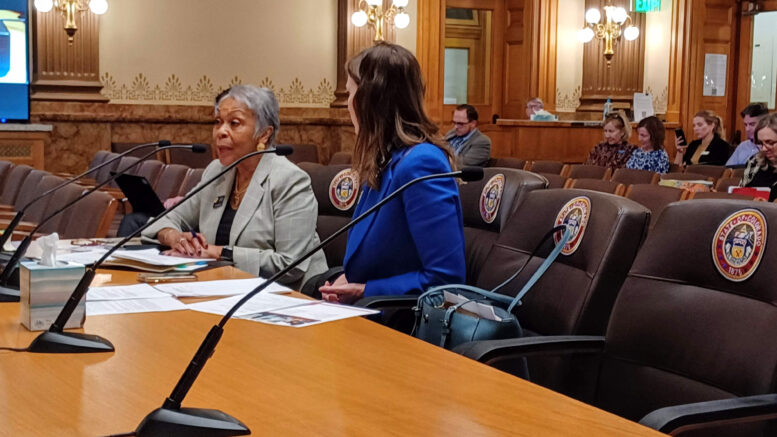A bill that would boost regulations on employers surrounding interviewing and hiring procedures in the name of pay equity cleared its first legislative committee Tuesday without the addition of any of a slew of amendments that had been requested by business leaders.
Senate Bill 105, sponsored by Democratic Sens. Jessie Danielson of Wheat Ridge and Janet Buckner of Aurora, may not have reached its final form as it heads to the Senate Appropriations Committee, which will weigh costs to the state that are estimated at $1.8 million annually. Danielson told the Senate Business, Labor and Technology Committee that she and Buckner are “considering even further changes that we couldn’t get to today.”
But as it stands, the bill continues to draw opposition from several business groups, including the Colorado Chamber of Commerce, that had negotiated with sponsors since last year to reduce some of the burdens in a law that went into effect at the start of 2021. That opposition played a key role in Republican Sens. Mark Baisley of Roxborough Park and Larry Liston of Colorado Springs being the lone votes against SB 105, which got the backing of all committee Democrats and Republican Sen. Perry Will of New Castle on Tuesday.
The major changes proposed by SB 105 include requiring the Colorado Department of Labor and Employment to investigate and adjudicate complaints about violations of the Equal Pay for Equal Work law rather than enforcing some provisions and sending most disputes to the courts. The bill also would require employers to notify other staffers about who was chosen for an open position or promotional opportunity and would increase from three years to six year the amount of back pay workers would be eligible for in cases where employers violated the law.
SB 105 does give some relief to companies to not have to advertise promotions that are part of a natural career progression, but it doesn’t touch the biggest source of dispute from the original law — its application to positions open to remote work. Some companies have stated that remote-work opportunities are not available to Colorado residents as a way of avoiding requirements of the law that include listing the salary range for the positions and advertising them to every member of the company, regardless of their qualifications.
Groups including the Colorado Chamber, Denver Metro Chamber of Commerce and Colorado Competitive Council asked sponsors to limit the requirement for employers to notify all workers of vacancies to just those vacancies for jobs that must or could be performed in Colorado. That would eliminate the burden of international employers with a presence in this state of having to tell Colorado workers of jobs that could be opening in other states or countries.
The organizations also have been talking with Gov. Jared Polis’ office about exempting from the original law companies that don’t have a physical location in Colorado or whose only Colorado workers are remote, which would allow firms that have barred Colorado applicants to begin accepting them again. However, neither supporters nor opponents of the bill have introduced any such proposed changes.
Danielson did add to the bill Tuesday minor changes that could soften some burdens on business. She extended from 5 to 30 days the amount of time that employers have to notify other employees about applicants chosen to fill vacancies, and she pushed back the proposed implementation date of the new law to January rather than August.
However, in an amendment that passed along partisan lines, Danielson exempted CDLE from having to investigate claims made by state employees, a situation that would have created an inherent conflict of interest if the department was to represent both the employer and employee, she said. She acknowledged the change should lower the price tag of the bill — an important consideration in a year in which the budget will be tight — but said that wasn’t the purpose of the amendment, particularly as state workers can still file lawsuits against the state government under the original law.
However, both Baisley and Liston questioned the optics of a change in the law that would subject private employers to additional scrutiny by CDLE investigators but exempt state workers who may have violated the law in the same way.
“I don’t think we should use the big hammer of government to wield this over private employers but not ourselves,” Baisley said.
SB 105 still has a long way to go through the legislative process, offering several chances for business groups to try to get the specific changes that they haven’t been able to procure so far. But its sponsors appear to be building momentum for the general changes outlined in the bill, saying that they will help to close historical gaps between pay for male and female workers and ban the types of pay discrimination that proponents described facing during the initial committee hearing on the bill last week.
“The testimony has stuck with me. What has stuck with me is the individual, personal stories — life-changing incidents around pay,” Buckner told the committee before it passed SB 105 along on a 7-2 vote. “We have seen what this (law) is doing to help those women in Colorado feel better about themselves, help their families and help themselves.”
